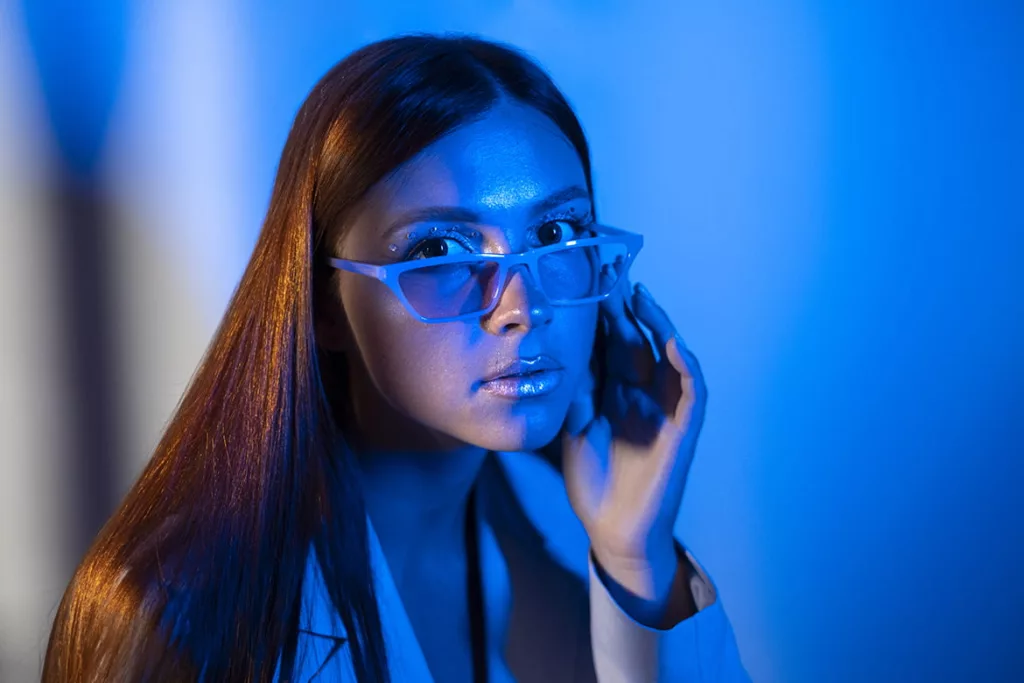
Computers. Smartphones. Tablets. High-definition TVs Refrigerators. Printers. Dashboards of automobiles Outdoor advertisement. Whatever it is, a bright digital display is certainly a necessary component. Blue Light Glasses, When you consider the number of digital screens your eyes are exposed to in a 24-hour period, it can feel as if your eyes are being pummeled with strong bouts of high-energy blue light get a glass from Glasseusa.com
Sadly, this can result in some common symptoms from which many of us may suffer intermittently or chronically. Have you suffered eye tiredness or headaches after sitting in front of a computer for a lengthy period of time? Do you experience fuzzy or blank areas in your vision that appear and disappear without warning? You may discover that your eyes are occasionally dry, causing enough irritation to require eye drops on a semi-regular basis.
Why Choose Blue Glasses
If you are suffering from these or other vision-related symptoms, they may be the result of extended exposure to HEV or high-energy blue light. These are just a few of the negative effects this type of light can have on your eyesight and general health. Digital eye strain is the more common term for these symptoms, which can have cumulative, long-term negative effects on your eyes. In addition to noticing that your vision is impaired or that your eyes feel tired and dry, exposure to this light can also disrupt your sleep.
Because the blue light emitted by our digital screens regulates our circadian rhythms, this is the case. Blue light can be beneficial to us when exposed in controlled doses and this light, along with the blue light that comes from the sunlight during day hours, is important for alerting our bodies when it’s time to be awake and when it’s time to wind down and be ready to go to sleep at night.
Too Much Exposure
But when you expose your eyes and brain to this same blue light. It should be emitted in the daytime during the evening. Particularly right before you go to bed. It can be detrimental to your ability to fall asleep and stay asleep. Our brain relies on the secretion of melatonin which is a natural chemical. The body produces to initiate and promote sleep.
But too much blue light exposure throughout the day and well into the night. It can disrupt the normal secretions of melatonin, making it tougher to fall asleep. The quality of sleep can also be negatively impacted. Leaving you feeling tired and sluggish when you wake up and keeping you fatigued as you carry on with your normal day.
Blue Light Glasses
With so many screens surrounding us, day in and day out, it’s important to try to minimize the effects of this blue light on our eyes. Particularly when we are perched in front of a computer screen for seven, eight or more hours a day. The best way to do that is by filtering out the levels of HEV we are receiving from the screens we are viewing most often. A reduction of light from those devices can be instrumental in preventing the long-term damage that can occur from an overabundance of blue light exposure to our crystalline lens, cornea, and retina.
But you may be wondering how this form of light can be so damaging to the eyes. It’s one thing to stare directly into the sun. But it’s another thing to stare at your laptop for half the day without respite. Well, let’s consider the sun for a second. It provides us with natural, life-sustaining light and is made up of a spectrum of colours that include blue, orange, red, yellow, and even green light, all of which are present due to electromagnetic radiation.
More to Know
Step outside and we will be exposed to all of these colours of the light spectrum as they combine to create the sunlight we receive every day. Each of these colours is made of light rays along different-sized with wavelengths containing different strength levels of energy within.
Longer wavelengths contain less energy while shorter wavelengths contain, you guessed it, higher amounts of energy. Going back to the various colours of light that comprises sunlight, red is among the longest of wavelengths. So it will contain some of the lowest levels of energy.
But blue light travels along much shorter wavelengths which means it contains. Some of the most robust energy of all the light across the spectrum. That’s why it’s often referred to as “high-energy blue light” which gives it similar properties to ultraviolet (UV) light.
This is the form of light that your computer, your TV, your smartphone or tablet, and the screen. In your new car’s dashboard emit every time they are operational. That means your eyes are taking in that energy from blue light whenever you look directly at these screens.
Conclusion
Wearing a pair of blue light glasses can be highly effective at filtering this exposure to your eyes and greatly reducing the symptoms that one can experience from too much blue light exposure to the retina, resulting in less digital eye strain.
You can find blue light glasses available in prescription and neutral versions so that individuals who need glasses from glassesusa.com to correct their vision can also do their eyes a world of good by filtering out the damaging effects of blue light. Those with perfect vision can get a pair of neutral or non-prescription lenses with blue light filtering capabilities.
The lenses in both instances are designed to filter nearly half of the blue light. It is emitted from your computer, smartphone, or tablet screens. Up to 95% of the most vital wavelengths of light. But without any yellow tints & often come about from regular light filters.
Blue light glasses from Glassesusa.com really can help by reducing the glare of blue light and eliminating the symptoms of headaches, dry eyes, blurred vision, dead spots, and eye strain that come with it.a
